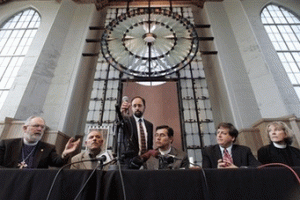LOS ANGELES (AP) - Churches in five big U.S. cities plan to protect illegal immigrants from deportation, offering their buildings as sanctuary if need be, as they pressure lawmakers to create a path to citizenship for the nation's estimated 12 million illegal immigrants.
Beginning Wednesday, a Catholic church in Los Angeles and a Lutheran church in North Hollywood each intend to shelter one person, and churches in other cities plan to do so in coming months as part of the "New Sanctuary Movement."
"We want to put a human face to very complex immigration laws and awaken the consciousness of the human spirit," said Father Richard Estrada of Our Lady Queen of Angels Catholic Church in Los Angeles, where one illegal immigrant will live.
Organizers don't believe immigration agents will make arrests inside the churches.
The U.S. Immigration and Customs Enforcement agency has not tried to arrest Elvira Arellano, an illegal immigrant who has taken shelter at a Methodist church in Chicago since August. Her son is a U.S. citizen and he has lobbied in the Mexican legislature on behalf of families that would be split if parents are deported.
ICE spokeswoman Virginia Kice declined to say if agents would attempt to arrest others who take sanctuary in churches, although she noted agents had the authority to arrest anyone violating immigration law.
Anti-illegal-immigration groups called the sanctuary effort misguided.
The faith groups "don't seem to realize that they are being charitable with someone else's resources, and that's not charity," said Ira Mehlman of the Federation for American Immigration Reform, which favors limits on immigration.
"We are talking about illegal immigrants taking someone else's job, filling up the classroom of someone else's child," he said.
The sanctuary effort is loosely based on a movement in the 1980s, when churches harbored Central American refugees fleeing wars in their home countries. Organizers of the current movement include members of the Jewish, Muslim, Catholic and other faiths.
Participating churches in San Diego, Seattle, Chicago and New York won't initially house illegal immigrants. Instead, leaders will provide legal counsel, accompany them to court hearings and prepare plans to house them in churches if authorities try to deport them.
The plans come as immigration reform legislation has been stalled since last summer, and tens of thousands of illegal immigrants have been detained and deported in stepped-up immigration raids in recent months.
The first to receive refuge in Los Angeles will be a single father from Mexico who has two children who are U.S. citizens, said Rev. Alexia Salvatierra, executive director of Clergy and Laity United for Economic Justice, an interfaith association spearheading the national plans.
In New York, churches will be aiding a Haitian man and a Chinese couple who are facing deportation and have children who are U.S. citizens, said Father Juan Carlos Ruiz.
Religious leaders gathered at the Roman Catholic Church of St. Paul the Apostle said their promise of sanctuary could include financial assistance, legal help and physical protection, if necessary.
"For us, sanctuary is an act of radical hospitality, the welcoming of the stranger who is like ourselves, the stranger in our midst, our neighbors, our friends," said Rabbi Michael Feinberg of the Greater New York Labor-Religion Coalition.
Jani, a U.S. citizen who did not give her last name, said her Haitian-born husband, Jean, is facing deportation because of a 1989 drug conviction in the U.S. that put him in prison for 11 years. She said the family would take refuge in a church, if necessary, rather than be separated.
The churches sought immigrants who wanted to take part in the sanctuary movement and were screened to make sure they paid taxes and didn't have criminal backgrounds, Salvatierra said. They chose the Haitan man because "his crime was 20 years ago and since then he has totally reformed his life," she said.
Associated Press writer Karen Matthews in New York contributed to this report.
Copyright © 2007 The Associated Press. All rights reserved. The information contained in the AP News report may not be published, broadcast, rewritten or redistributed without the prior written authority of The Associated Press.

















